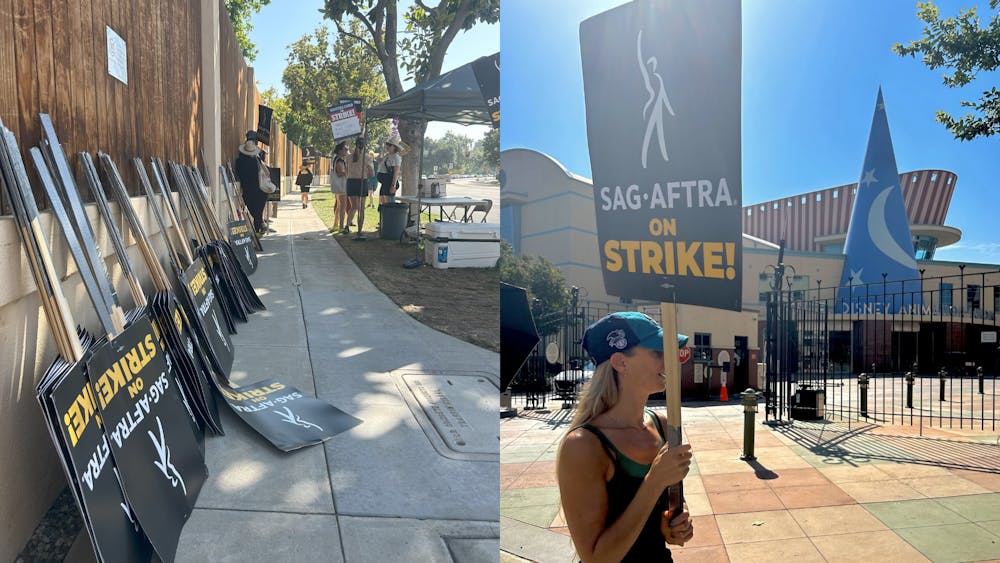Kai Swanson, a cinema and television arts professor, said they have been using the Writer’s Guild of America strike and following settlement as an educational tool for her students.
“In my teaching, I've incorporated discussions around these issues, emphasizing the significance of contract terms, union negotiations, and the broader implications for the industry,” Swanson said.
Swanson also teaches summer courses at the Elon in Los Angeles program and reflected on how students were able to see the real-life implications of the strike, and what information is the most important for them to know for their future career.
“While teaching CTA 2700 Comedy Writing and CTA 2701 Comedy Production for Elon in LA over Summer 2023, students were able to see and feel everything as they were right in the center of Hollywood where strikes and negotiations were taking place, the strike has underscored the importance of being well-informed about the current state of the industry, the nuances of contract negotiations, and how to prepare to navigate such challenges in their future careers in the film and television industries,” Swanson said.
The WGA reached a tentative agreement after months of negotiations with studio executives. The deal came on Sept. 24, over four months after the strike began May 2. This agreement comes after negotiations restarted, bringing an end to the strike that has paused production and project development.
Swanson said for many in the industry, the strike has halted any development and changed the way they feel about the future of their careers.
“This experience has been both a lesson and a call to action for them, emphasizing the importance of solidarity, understanding contracts, and being proactive in advocating for their rights and fair compensation in their future careers,” Swanson said.
Swanson said the strike could change what working in this industry will look like in the future..
“One of the most significant changes I foresee is a shift in the business model of television and film. TV is undergoing a transformation, with contraction being a major theme,” Swanson said. “This could lead to fewer shows but with a greater commitment to quality, longevity, and fair compensation for all involved.”
Students have also been reflecting on the deal. Alex Chadwick, a Cinema and Television Arts major, talked about their time in Los Angeles over the summer, and how the strike affected that time.
“There were a lot of situations where sets were canceled and internships had to let their interns go. Luckily, my internship at a production studio had plenty of work for me in the commercial or advertising,” Chadwick said.
Chadwick also reflected on the positives of the strike, and how much is changing in the industry.
“My experience [in Los Angeles] was definitely altered by the strike, but I was happy to show my support for the writers. The strike was absolutely necessary.” Chadwick said.
Chadwick said that the deal will change the environment for the industry, and spoke about parts that are extremely relevant for them too.
“I’m really hopeful that the industry will change to create a better environment for the writers. I’m also happy that AI concerns were addressed, [because] as a writer, I know I was scared of the consequences of artificial technology on my future,” Chadwick said.
Chadwick also spoke on their hope for the future, and where they are able to see some hope for their career.
“I definitely feel more secure about finding a job post-grad in film. The strike and the deal that came from it motivates me to continue working hard to pursue my passions and fight for my rights.”
Henry Heimlich, another Cinema and Television Arts student also spoke about his views on the deal.
“I think the end of the strike is a great thing. The WGA fought hard, stayed together, and really made the studios hurt”, Heimlich said.
Heimlich also spoke about his future, and how he feels about not only his future career but also about his plans to study in Los Angeles in the Spring of 2025.
“I don’t think the details of the deal have been publicized yet, but from what they’re said it’s better than anyone expected. For me, personally, I feel like I have a chance at finding a career, and being able to find an internship as a writer again,” Heimlich said.
The WGA has not released the entirety of the deal as of Oct. 2, but according to CBS, a WGA representative said the three-year deal includes a 12.5% pay increase starting with 5% upon the ratification of the contract, as well as a 76% increase in foreign streaming residuals. Studios will also be required to inform writers when AI is used and cannot use writers’ material to train AI.


